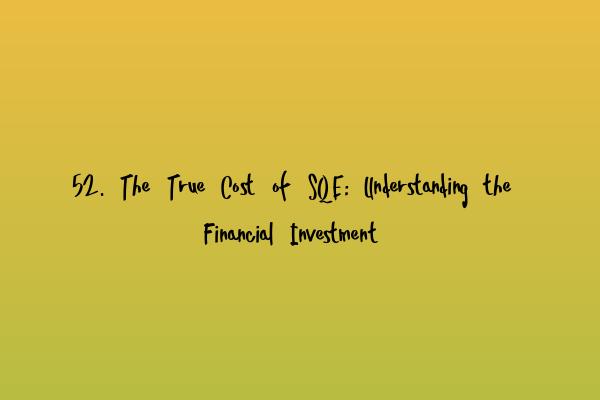The True Cost of SQE: Understanding the Financial Investment
Aspiring solicitors who are on the path to becoming qualified lawyers in England and Wales are all too familiar with the Solicitors Qualifying Examination (SQE). This new assessment, introduced in 2021, has replaced the previous pathways to qualification, such as the Legal Practice Course (LPC) and the Qualified Lawyers Transfer Scheme (QLTS). While the SQE offers a standardized approach to qualification, one critical aspect that cannot be overlooked is the financial investment required to successfully navigate through this examination.
Before delving into the true cost of the SQE, let’s briefly examine what the examination entails. The SQE consists of two stages: SQE1 and SQE2. SQE1 focuses on testing candidates’ functioning legal knowledge, while SQE2 assesses skills such as legal writing, drafting, advocacy, and client interviewing. Passing both stages of the SQE is essential for candidates to qualify as solicitors.
Now, let’s dive into the financial aspect of the SQE and understand the various expenses involved:
Tuition and Preparation Courses
Preparing for the SQE requires substantial dedication and commitment. Many aspiring solicitors opt to enroll in preparation courses to ensure they have a solid foundation and adequate knowledge to pass the examination. These courses are offered by various providers and are designed to equip candidates with the skills and understanding necessary to tackle the SQE successfully.
While the cost of preparation courses can vary depending on the provider and the length of the course, it is vital to view this as an investment in your future legal career. These courses offer valuable guidance, extensive study materials, and mock exams to help you gain confidence and refine your skills. The investment in a quality preparation course can significantly enhance your chances of success in the SQE.
If you’re looking for further guidance on preparing for the SQE, you can check out our article on SQE Case Studies: Applying Knowledge in Real-Life Scenarios.
Examination Fees
Registering for the SQE and sitting the examination itself incurs additional costs. The examination fees for both SQE1 and SQE2 can vary depending on several factors, including your chosen assessment center and whether you need to retake any parts of the examination.
While the fees associated with the SQE may seem daunting, it is crucial to recognize that this is a necessary investment in your legal career. The opportunity to become a qualified solicitor and pursue a rewarding profession often outweighs the financial considerations in the long run.
For insights on managing your time effectively during the SQE, be sure to read our article on Mastering Time Management in SQE: Strategies for Efficient Exam Completion.
Practical Skills Training
In addition to the examination fees and preparation courses, candidates also need to consider the practical skills training required to excel in the SQE2. This training is typically offered by law firms, professional bodies, or specialized training providers.
Practical skills training focuses on honing the abilities necessary to perform tasks such as legal drafting, interviewing clients, and presenting legal arguments effectively. While this training can come at an additional cost, it is a vital component of preparing for the SQE2.
If you’re interested in evaluating your performance and identifying areas of improvement, you can refer to our article on Analyzing Mock Results for SQE: Identifying Areas of Improvement.
Travel and Accommodation
For candidates who live outside of major cities where the SQE assessment centers are located, travel and accommodation costs should be factored in. The SQE assessments are typically held in designated centers, and candidates may need to travel to these locations multiple times throughout their SQE journey.
Travel and accommodation costs can vary depending on the distance you need to travel and the duration of your stay. Planning and budgeting for these additional expenses are essential to avoid any last-minute financial strain.
Continuing Professional Development (CPD)
Once you have successfully completed the SQE and are admitted as a solicitor, it is important to note that the journey does not end there. Solicitors are required to undertake Continuing Professional Development (CPD) to maintain and enhance their knowledge and skills throughout their legal careers.
CPD courses and events can come at an additional cost and should be factored into your overall financial investment in becoming and maintaining your status as a qualified solicitor.
To master the multiple-choice questions (MCQ) in SQE1, be sure to check out our article on Conquer the Multiple Choice Questions (MCQ) in SQE1.
Conclusion
The SQE is undoubtedly a significant financial investment for aspiring solicitors. While the costs can be substantial, it is essential to view these expenses as necessary steps on the path to a rewarding legal career. Investing in quality preparation courses, examination fees, practical skills training, and continuing professional development are all crucial to ensuring success in the SQE and beyond.
Remember, the rewards of becoming a qualified solicitor far outweigh the financial considerations in the long run. So, embrace the challenge, plan your finances wisely, and take the leap towards a fulfilling and prosperous legal career.
If you’re looking for tips on mastering effective revision techniques for the SQE, be sure to read our article on Mastering Effective Revision Techniques for SQE Success.
